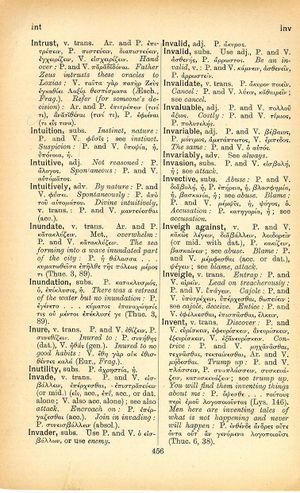inure: Difference between revisions
From LSJ
ἡδονήν, μέγιστον κακοῦ δέλεαρ → pleasure, the greatest incitement to evildoing | pleasure, a most mighty lure to evil | pleasure, the great bait to evil
m (Text replacement - "<b class="b2">Frag.</b>" to "''Frag.''") |
m (Woodhouse1 replacement) |
||
| Line 1: | Line 1: | ||
{{Woodhouse1 | {{Woodhouse1 | ||
|Text=[[File:woodhouse_456.jpg|thumb|link={{filepath:woodhouse_456.jpg}}]] | |Text=[[File:woodhouse_456.jpg|thumb|link={{filepath:woodhouse_456.jpg}}]] | ||
P. and V. ἐθίζειν, P. συνεθίζειν. | ===verb transitive=== | ||
[[prose|P.]] and [[verse|V.]] [[ἐθίζειν]], [[prose|P.]] [[συνεθίζειν]]. | |||
[[inured to]]: [[prose|P.]] [[συνήθης]] (dat.), [[verse|V.]] [[ἠθάς]] (gen.). | |||
[[inured to no good habits]]: [[verse|V.]] [[ἔθη γὰρ οὐκ ἐθισθέντες καλά]] ([[Euripides|Eur.]], ''Fragment''). | |||
}} | }} | ||
Revision as of 08:57, 20 May 2020
English > Greek (Woodhouse)
verb transitive
P. and V. ἐθίζειν, P. συνεθίζειν.
inured to: P. συνήθης (dat.), V. ἠθάς (gen.).
inured to no good habits: V. ἔθη γὰρ οὐκ ἐθισθέντες καλά (Eur., Fragment).

